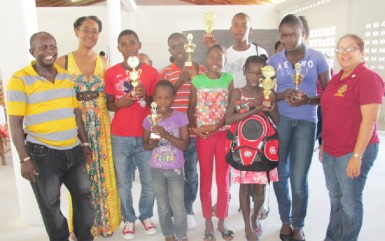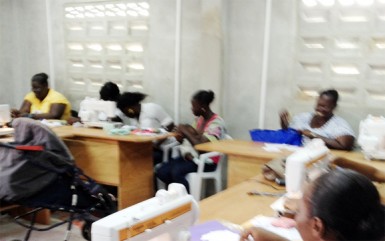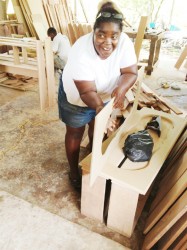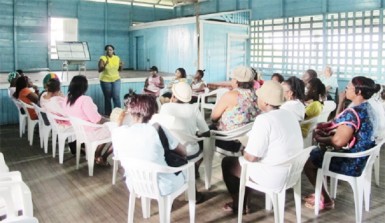Three years ago there was little hope that 13-year-old Adunni Blair would have gone on to attend secondary school, but today after participating in the Buxton Youth Developers Literacy Project she is a student of the Annandale Secondary School on the East Coast, and is performing exceptionally well.
Blair herself recognizes the positive impact being a part of the group has had on her life, as the shy teen quickly said that the group has “help me to pass to go to Annandale Secondary School,” when asked how has she benefited.
It was the potential seen in Blair and so many other children from Buxton who were unable to access tutorship that prompted Robin Phillips to form the group a little over six years ago on March 10, 2007.
Blair and many other children her age received personal invitations from the determined Phillips who told the Sunday Stabroek that the work he and ten other volunteer teachers do with the children is continuous. He said Blair is testimony to the work of the group.

The Buxton literacy group is one of the many programmes the Rotary Club of Stabroek has been supporting during its relatively short life span which began on May 16, 2007.
According to Anand Harrilall, past president of the club and public relations officer, the club has organised national spelling B competitions and national quizzes, but they also do a lot of community based projects. He said the club’s interest gravitated towards literacy projects because they recognized that there is a huge gap in Guyana when it comes to literacy. They teamed up with Phillips and his group who started with about 30 children which has now grown to over 300 children, and the programme runs from Monday to Saturday in the afternoon.
Interestingly the project also has a sports arm, and the children are also g the taught to play different sports to ensure that they have fun while learning.
“The concept to that project is sports, education and culture, so they learn through sports, education and culture We are trying to teach them not only about their own culture but the culture of other communities… and it is really, really catching on. From 2006 to date over thirteen hundred and seventy-one children would have passed through the programme,” current President Luana Falconer explained.

While the club supports the project, it is not its own members who do the teaching but rather some volunteers, and Harrilall said they have been able to observe the amazing growth of the children in literacy as many learn how to read and write. Further evidence that the project is making an impact is the fact that the children who are members perform better at the Grade Six examination than other children. Another positive aspect of the project according to Harrilall is getting the children “more grounded,” since they have to conform to certain behaviour once they are involved. Spelling competitions are also organized which gives the children an opportunity to be tested and also to improve their public speaking skills.
When the project started it was just after the crime wave, and Harrilall said it was a tough time for them as they were subjected to a lot of scrutiny by the villagers, but they toughed it out because ultimately they wanted to help the children. They also wanted to help to dispel the negative image of the community even though they were scared for their own safety initially.
It was Phillips who approached one of their club’s members ‒ Lennie Shuffler ‒ to support the initiative and that is how the partnership between the club and the group started.
Falconer said that it was the impact and influence that the crime spree had on the children that made them brave their fears and enter the village, because they realized without assistance it was a generation lost.

And through the funding of the Canadian International Development Agency (CIDA) and the New Zealand government the project now has a massive building in Vigilance, as initially the lessons were being held in the old Buxton market. Falconer said that not only was that area not ideal but it was also too small to accommodate all the children who wanted to join, and at one time there were children with small stumps of pencils writing on the walls of the market.
Apart from the building they also have ground space to play games and CIDA recently donated computers to the centre.
Other initiatives
President elect Sharon Sue-Hang-Baksh, who takes over from Falconer when she demits office in June, explained that with the success of the Buxton project similar projects were also initiated in the villages of Ithaca, La Grange, Nismes and Bagotville.
The current president said that the initiatives have been so successful that when they held spelling competitions the judges this year ran out of ten and eleven letter words for the children to spell, and it almost become like a contest between the judges and the contestants. She said they had not grasped how much the children had improved until they were put to the test.
Falconer said initially the project in La Grange, Nismes and Bagotsville, which is an empowerment project for women, started out with the objective of training unemployed persons and single parents with life skills to enhance their lives. Sewing and fabric designing, carpentry, masonry and joinery were some of the skilled areas to be focused on but no men joined the programme. So it is women who are a part of all the projects and the club is paying persons who have apprentice shops in the area to train the women.

The women have learnt to make bed sheets, mosquito nets and curtains.
Two women who are part of this initiative are 34-year-old Karen Roberts and 39-year-old Yolanda Tarrington, who both have plans to become seamstresses when the three-month programme comes to an end later this month.
Both women are married but told this newspaper that they felt the need to be a part of the programme because they wanted to assist their husbands in contributing to the financial upkeep of their homes.
They both also expressed joy at being a part of the programme, revealing that they have made many friends and all of the participants bonded during the period.
In the course of the programme the women were also exposed to counselling sessions, and according to Falconer this really helped them to deal with certain issues in their lives. She told the story of a woman who had not spoken to her daughter for years, but after one counselling session she went home and hugged her child and they are back on speaking terms.
“And so it is very satisfying to us that we could have this kind of impact on the lives of persons considered to be the most vulnerable in our society, and I think that is what makes our club stand out from the other clubs. Most of our projects, if not all, [are] at the community level; we go down and dirty for the people who need it most,” Falconer said.
The club with assistance from Rotary International and the Rotary Club of Daytona Beach West also provided water tanks for residents of Kabakaburi and St Monica villages in Region 2 after they had done an assessment on how they could assist them with their water woes and health problems. It was the residents who suggested the water tanks, and according to Harrilall since the water tanks were provided they had been informed that there was a reduction in diarrhoeal illnesses in the villages.
The club is also building a home for former prison officer Roxanne Winfield, who was shot and injured when the five prisoners escaped from the Georgetown Prison in 2002. Ths is expected to be finished by June, and while they have committed to building the home they want assistance to furnish it. The home is being built with huge financial support from the Guyana government.
Falconer said the club is also the sponsor for the Interact Club of St Joseph’s High School, and recently inducted a new club at the school. Harrailall explained that interact clubs are the younger arm of the Rotarian family intended for young people between the ages of 13 and 18. During their time in the club they are groomed for developmental work and are assisted in the areas of planning, in addition to which they build up their self-confidence.
There are six Rotary clubs in Guyana and when the Stabroek group was formed there were already three clubs in Georgetown. According to Harrilall, however, that the Rotary Club of Georgetown Central realized that the younger persons with an interest in Rotary work may need their own club, and that is how they were formed.
“We obviously stepped up to the plate and we have done well and we are still doing well… and this is not tooting our horns, but we have been recognized for the work we have been doing and every year we have been receiving Rotary awards…” Harrilall said.
They have been recognized as the best district club in the Caribbean and also received the highest Rotary Award which is Presidential Citation with Distinction from Rotary International.
The club has 33 members and over the years they have had a few deaths and migrations while some persons dropped out. The club work has been supported by the Governments of Guyana, Canada and New Zealand, UNICEF, Habitat for Humanity, Rotary International, Scotia Bank, Digicel, GT&T, Ansa McAl, Banks DIH, JFL and Food for the Poor.





